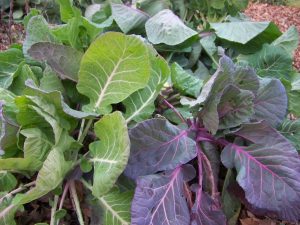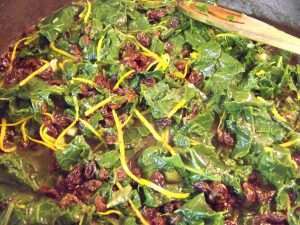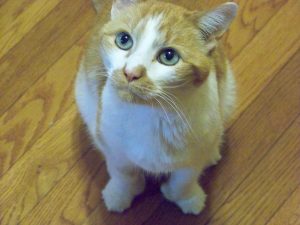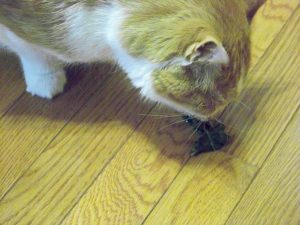As the days shorten and daylight “savings” time – what a name! – is about to make oncoming winter even more official, I come in from canvassing for my chosen presidential candidate and turn to the stalwarts still waiting patiently out in the garden, which a little cold only improves: two kinds of kale, two kinds of Asian greens, and the crowning beauties, purple and white and blue-green — collards.

This summer I was given some seeds of a variety called Willis, from North Carolina, and couldn’t resist planting them. Ever since, I’ve loved the sight of them in my garden, so reminiscent of many a garden back home. But for some reason I’ve been putting off cooking them, maybe out of a lingering idea from my Alabama childhood that collards are mainly for old people (since old people were the only ones who seemed genuinely to enjoy them, and of course, in Alabama, tended to pronounce them “colliards.”) A while back, though, I heard Bryant Terry interviewed on “The Splendid Table” about his book Vegan Soul Kitchen (the title alone had my complete attention, instantly) and heard his recipe for Citrus Collards with Raisins. I knew I would make them. And on this chilly fall night, I have. And I can only say: Damn, y’all.

What a great dish. Savory, citrusy, subtle, not chewy or tough (if you follow Terry’s directions, you get perfectly cooked and soft collards, not ribbiness or that olive-green overboiled color.) Not a bit of meat here: just raisins, orange juice, a little bit of garlic (also from my garden) sauteed in olive oil, collards, and strips of orange zest (my addition to the recipe – I like the extra kick of citrus.) Yet it has a rich, subtle flavor that I can really see scratching that itch for meat that does still lurk in some vegan/vegetarian hearts. I inhaled a big helping along with a little Italian sausage on the side — a simple wintry supper — and was pleased by the feeling I was left with, replete and energized rather than logy or stuffed. If I listen closely, I can hear all my cells singing praise: vitamin C, soluble fiber, and a mess of anticancer compounds are just a few of the good things collards contain.
Of course, Pitty Sing, my Alabama-native polydactyl barn cat, was begging, so of course I gave him a taste. (He’s an adventurous eater; all sources say a little greens won’t hurt him.) He turned up his nose at a raw collard shred but devoured a cooked one:



As the winter comes down, it feels good to draw on my garden and what it’s given me – including my jars of preserves and braids of garlic in the basement – to enjoy one of the homeliest of foods in a whole new way.